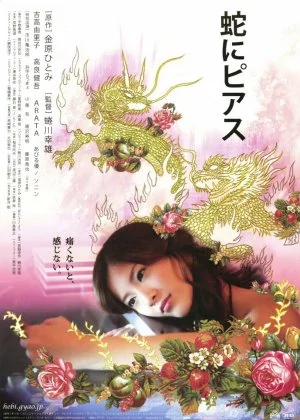Snakes and Earrings
Whenever the word hebi (snake) pops up in Japanese film titles, chances are you can expect something situated in the margins of society. Notorious examples are Shinya Tsukamoto's Rokugatsu no Hebi and Takashi Ishii's Hana to Hebi (beware!). Compared to these two films, Snakes and Earrings [Hebi ni Piasu] is actually quite tame, though unsuspecting film fans may still be surprised by what they find behind the warm exteriors of this unusual drama.
![screen capture of Snakes and Earrings [Hebi ni Piasu]](/thumbs/style/site/1200xauto/hebi-piasu-1.webp)
Yukio Ninagawa never backed away from adding some controversial themes to his films. His comeback title Ao No Hono-o treaded around some delicate issues, Snakes and Earrings takes a very similar road. The difference is that the setting of Snakes and Earrings may alienate people enough to ease the blow a little. By society's standards, the film's protagonists are all freaks, which makes it easier to assume they're suffering from some kind of social illness rather than fighting their own demons. Ninagawa, obviously realizing this, countered by planting a big, pulsating and all-enveloping heart in the middle of his film.
The film follows the life of Lui, who runs into a punk fan called Ama. Lui is intrigued by Ama's appearance, especially his split tongue. The two start dating and slowly Ama's influence starts to rub off on Lui. Ama takes her to his favorite tattoo parlor, where she is introduced to a series of different body decorations and modifications. That's where she meets Shiva, a tattoo specialist and self-proclaimed sadist.
Behind Ama's back, Lui and Shiva start their own little perverted relationship. It's not so much that Lui feels let down by Ama, but Shiva's perverse tendencies are apparently intriguing enough to risk her current relationship. This weird little triangle goes on for a while, until the moment when Ama suddenly disappears. Lui tumbles down a black hole, clinging to whatever reminds her of Ama.
![screen capture of Snakes and Earrings [Hebi ni Piasu]](/thumbs/style/site/1200xauto/hebi-piasu-2.webp)
Even though the theme is often harsh and impenetrable, Ninagawa gives the film a rather warm and inviting shine. Most scenes are shot indoors, where the proper lighting makes for often cozy and atmospheric settings. The camera work is straight-forward but controlled and well-executed, the intro in particular is of extraordinary beauty. A long tracking shot through the Tokyo crowds, following Ama into the nightclub where he'll meet up with Lui for the first time.
The soundtrack too is a little different. From the by earbuds-muted intro (a great detail) to the incredibly atmospheric piano and ambient music later on, it blesses the film with an alien yet comfortable vibe. It's nice to see that Ninagawa opted for something different, because the basic Japanese drama score just wouldn't have cut it here.
Between all the sadism, sadomasochism and various forms of body mutilation, there are three actors who lend the film a proper heart. Kengo Kora and Shun Oguri are superb as the two male leads, Yoriko Yoshitaka transforms into Lui, a pretty daring role to take on. These three actors really carry the film, making sure the film isn't just about the ever declining morals in youth culture, but about three individuals who do their best to overcome their own limitations.
![screen capture of Snakes and Earrings [Hebi ni Piasu]](/thumbs/style/site/1200xauto/hebi-piasu-3.webp)
So yeah, there's people with piercings and red hair, there's a fascination for tattoos and some perverse sexual scenes, but these are put in sharp contrast with the warm and humane vibe coming from Snakes and Earrings. This is not a film about some out of control young kids, which by itself is quite a feat already. Ninagawa shows the proper respect for his subjects and because of that the trip down the self-mutilation road in an intriguing one to take.
Hebi ni Piasu still bares traces from the typical Japanese drama, but because of its setting and themes it differentiates itself from the countless others that are released year in, year out. It's a beautiful film, sometimes alienating, sometimes weird and impenetrable, but always humane and warm, embracing its characters rather than discarding them as outcasts.
